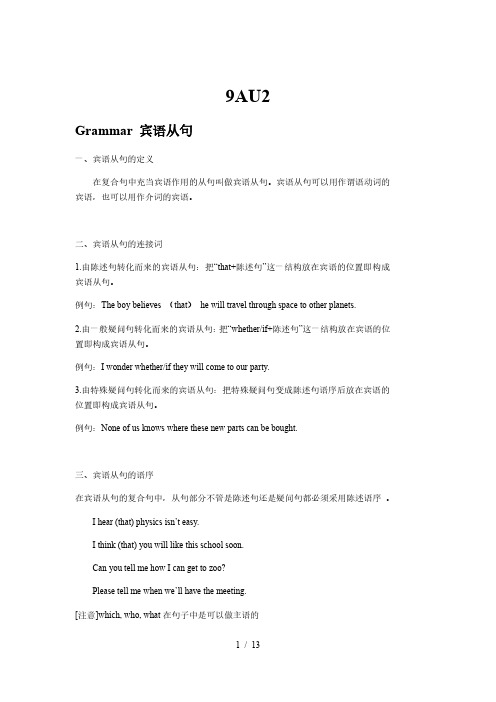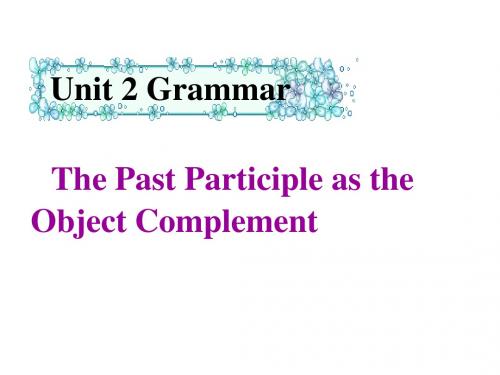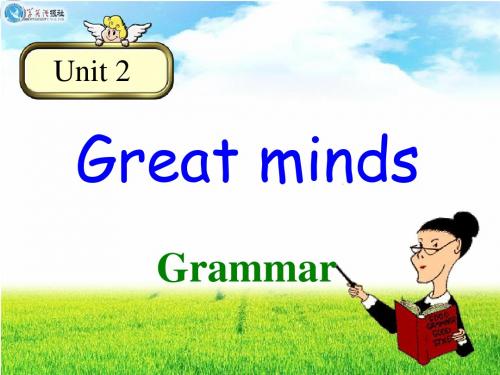U2 grammar
九年级上册(初三上学期)英语U2 Grammar 教案

九年级上册)Unit 2 ColoursGrammarI. Teaching aims and learning objectivesBy the end of the lesson, students should be able to:1. use object clauses introduced by “that”;2. use object clauses introduced by “if” or “whether”;II. Teaching contents1. New words: relationship, certainly, everyday, personal, ancient, suit, celebration2. New structures: Some people believe that colours can influence our moods.You may wonder if/whether colours influence our moods.III. Focus of the lesson and predicted area of difficulty1. Understand the differences between object clauses introduced by “that” and object clauses introduced by “if” or “whether”;2. Use object clauses introduced by “that”, “if” and “whether” correctly.IV. Teaching proceduresStep 1 Lead-in1. Talk about an English songT: As we know, colours can influence our moods. What else can influence our moods?S: I think that ________ can influence our moods too.T: We believe that many things around us can influence our moods. For example, music. Now, let’s enjoy an English song.T: How do you feel? Do you feel relaxed or nervous? What do you think of the music?S: I think that the music is ________________________.2. Talk about the singersT: Yes, I think that the music sounds sweet and warm. Then what do you think of the two singers?S: I think that _________________________________.T: Right. We can see that both of them are good at singing. It also shows that they impressed us with their nice voices.3. Talk about the showT: My favourite singer Na Ying is their teacher. I’m so glad. What do you think of the show The Voice of China? We all know that the show was popular during the summer holiday. We hope that the show will be more and more popular in the future.【设计意图:通过热播节目“中国好声音”中的一首英文歌曲导入新课,引出that引导的宾语从句,同时自然地让学生通过讨论歌曲、歌手和节目,感知并试着运用that引导的宾语从句。
Unit 2 Grammar 牛津译林版英语九年级上册讲义 (含答案)

9AU2Grammar 宾语从句一、宾语从句的定义在复合句中充当宾语作用的从句叫做宾语从句。
宾语从句可以用作谓语动词的宾语,也可以用作介词的宾语。
二、宾语从句的连接词1.由陈述句转化而来的宾语从句:把“that+陈述句”这一结构放在宾语的位置即构成宾语从句。
例句:The boy believes (that)he will travel through space to other planets.2.由一般疑问句转化而来的宾语从句:把“whether/if+陈述句”这一结构放在宾语的位置即构成宾语从句。
例句:I wonder whether/if they will come to our party.3.由特殊疑问句转化而来的宾语从句:把特殊疑问句变成陈述句语序后放在宾语的位置即构成宾语从句。
例句:None of us knows where these new parts can be bought.三、宾语从句的语序在宾语从句的复合句中,从句部分不管是陈述句还是疑问句都必须采用陈述语序。
I hear (that) physics isn’t easy.I think (that) you will like this school soon.Can you tell me how I can get to zoo?Please tell me when we’ll have the meeting.[注意]which, who, what在句子中是可以做主语的I wonder who is Tom’s English teacher.I don’t know what can be avoided.四、宾语从句的时态1. 如果主句的时态是一般现在时,宾语从句该用什么时态就用什么时态。
I don’t think (that) you are right.Please tell us where he is.Can you tell me how I can get to the railway station?2. 如果主句的时态是一般过去时,宾语从句只能用相应的过去时态(一般过去时,过去进行时,过去将来时,过去完成时)。
牛津七上课件U2 Grammar

C Complete the conversation with the
correct forms of the verbs in brackets. (P24) Do you ______ play (play) Daniel: Hi, Simon. _____ football at weekends?
当主语是第一人称、第二人称、第三 人称复数或复数名词时,谓语动词要 用原形;其否定形式一般在谓语动词 前加don’t (do not)。 eg: I go to school on Sunday. I do not (don’t) go to school on Sunday. We go to the park on Sunday. We do not (don’t) go to the park on Sunday.
The forms of the simple present tense The simple present tense has these forms. Read them and note that we add –s to the verb after he/she/it in positive sentences. I walk. We do not walk. Do they walk? He walks. She does not walk. Does it walk?
verbs
Most verbs
forms
+s
examples
Verbs ending in - y + ies a consonant + y Verbs ending in + es ch, sh, ss or x Some verbs + es ending in o
U2 Grammar 2

bite
I saw _______________________ him bitten by a dog.
I saw him beaten by his mother.
I saw him bitten by a dog. I saw him robbed by a man. I saw him knocked down by a car. I saw him taken to the hospital.
2.Though I have often heard this song ______, but I have never heard you _____ it.
A. singing, sing B. be sung, singing
C. sung, sing D. sung, singing
本题答案是C. sung, sing。第一空格填sung ,过去分词作宾补, 表被动,第二个空格填sing ,不定式作宾补,表过去的经历。这 句话的意思是,虽然经常听到别人唱这支歌,但是我从未听你唱 过(这支歌)。
2.表使役的动词:have, make, get等。 have /get + n. /pron. + p.p Speak a little louder to make yourself h eard by us all. 说话声音大一点,让我 们都听到。
We should work harder to get the work done on time. 我们应该努力工作以按时 完成任务。
4. with his hands (tie); with many flowers (plant) around the building The thief was brought in with his hands tied behind his back. With many flowers planted around the building, his house looks like a beautiful garden.
深圳版牛津英语九年级上册课件U2 Grammar

1
1
At school, Einstein’s ability _to__d_o_M__a_t_h_s surprised his teachers, but he was bored wAit2hCotohmerplseutbejtehcetsp. aArtatghreapahgeboeflo1w5,whieth watshegiwveonrdths efrcohmantchee _tbo_o_xg_.o_(t_Po_2_u4_n)_iv_e_r_s_it_y_, butbheecodmidenaostcdieonwtisetll egnooutoghuninivtehresietxyam. HeddoidMnaotthlsose heart, hotrwyeavgera,inand he had a wisht_o_t_r_y_a_g_a_i_n_ the next year. This time, he succeeded. He kept trying, so he achieved his dream _to__b_e_c_o_m_e__a_s_c_ie_n_t_i_st_.
question? 6. My wish to visit France has come true at
last.
1. Einstein often received i_n_v_i_ta_t_io_n__s _ _to__e_x_p_l_a_in__ his theories at different
1.To do that sort of thing is foolish. 主语
2.I want to see you this evening.
宾语
动 词 不
3.The purpose of education is to develop
U2 Grammar

如果今晚下雪,他们将不出去了。
If it were to snow this evening, they would not go out.
时间状语从句time
when / while when 既可指某一时间点,也可指一段时间; while指“在某一段时间里”,“在……期间”, 引导的动作必须是持续性的.
so that 以便…… ,为了…… (目的状语从句) so … that … 如此……以至于…… (结果状语从句)
比较:
He walked very fast so that he could catch up with us.
(目的状语从句) He walked so fast that he caught up with us. (结果状语从句)
B2 Join the sentences in column A and column B with the words from the box. because if since so … that so that
A B I exercise a lot. I was three years old. I have lived in London. I want to lose weight. Lucy is good at art. Everybody could hear him. He raised his voice. She won the school painting competition. Your parents will be proud of you. You win the game. 1.I exercise a lot because I want to lose weight. 2.I have lived in London since I was three years old. 3.Lucy is so good at art that she won the school painting competition. 4.He raised his voice so that everybody could hear him. 5.Your parents will be proud of you if you win the game.
9上u2 Grammar
课题:九上Unit 2 ColoursGrammar主备:课型:新授审核:区九年级英语备课组班级姓名学号【教学目标】1.掌握下列词汇、词组和句型,并能熟练朗读和运用。
词汇:relationship, certainly, everyday, personal, ancient词组:influence our everyday lives in many ways句型:Some people believe that colours can influence our moods.True, but it depends on personal taste.You may wonder if/whether colours influence our moods.Was yellow once the colour of the rulers in ancient China?2. 学会运用that引导的宾语从句。
3. 学会运用if或whether引导的宾语从句。
【教学重难点】能正确理解that, if或whether引导的宾语从句,并能灵活运用。
【教学过程】Step1. Lead-inHave a free talk with the Ss about colours and moods.Step2. Presentation and PracticeⅠ1. Present object clauses introduced by that.2. Finish some exercises.3. Finish the exercises on Page 26 and check the answers.Step3. Presentation and PracticeⅡ1. Present object clauses introduced by if or whether.2. Present the differences between if and whether and do some exercises.3. Finish some exercises.4. Finish the exercises on Pages 27-28 and check the answers.Step4. HomeworkFinish off the exercises on the teaching and learning paper.【语法小贴士】宾语从句一、概念宾语从句是指在复合句中充当宾语的句子。
九年级上册(初三上学期)英语U2 Grammar 课件
Should she choose an English song for the next battle?
She wants to know __if_/_w_h_e_t_h_e_r _s_h_e_s_h_o_u_l_d_c_h_o_o_s_e_a_n__E_n_g_l_is_h_ _s_o_n_g__fo_r__th_e__n_e_x_t _b_a_tt_le_._____
that is a statement (陈述句). In informal
English we often drop “__th__a_t _”.
Try to add “that” to each object clause.
Millie: Did you know there is a relationship between colours and moods?
Homework
• Finish the letter. • Learn to sing your favourite English
song and share with classmates.
Millie: Yes. I notice light colours make rooms seem larger.
Sandy: Sure. I also know blue can make us feel relaxed
Millie: Yes. My mum says blue is suitable for bedrooms.
I think (that) the music sounds sweet and warm.
We can see (that) Bboth of them are good at singing. It shows (that) Tthey impressed us with their nice voices.
U2 Grammar课件 (牛津版七年级上册)
(见全品11)
[探究] (1)make 用作使役动词,意为“使得”。 如: Your help made the work easy. 你的帮助使这项工作容易了。 (2)make用作实义动词,意为“做;制作”。如: Can you make a cake?你会做蛋糕吗? (3)“make sb./sth.+adj.”意为“使某人/某 物……”。如:The news makes him very happy. 这则消息使他非常高兴。
Practise
你家有多少口人? — How many members are there in your family? 1. 她是阅读俱乐部的一名成员。 She is a
member of the Reading Club.
2. 我们是学校篮球队的成员。 We are members of our school basketball team.
(2)接句子:hope+从句 I hope I can be a doctor like my father. 我希望我能成为一名像父亲一样的医生。 My mother hopes I can be a doctor. 我母亲希望我能成为一名医生。 [拓展] 特殊用法:hope可以和so连用。 I hope so.我希望如此。 We hope so.我们希望如此。
(见全品10)
句中的 hope.(vt.&n.)希望 。 [观察] I hope his dream comes true. 我希望他的梦想能够实现。 We hope to visit England some day. 我们希望有一天能够参观英国。 [探究] hope有以下几种用法: (1)接动词不定式:hope to do sth. I hope to be your friend. 我希望成为你的朋友。 We hope to visit the Great Wall. 我们希望去参观长城。 [注意] 不能说:hope sb. to do sth.
U2---Grammar
简单句的五种句型 主语+系动词+表语 主语+不及物动词 主语+及物+宾语
主语+及物动词+宾语1+宾语2 主语+及物动词+宾语+宾语补足语
英文表示 S + V + P S + Vi S + Vt + O
S +Vt +O1 + O2
S + Vt+ O + C
句子成分
主语(subject)
主语就是------发出动作的人或者物。 找出下列句子的主语。 1. 昨晚我写了一封信。 2. 今天下午我想同你谈谈。 3. 他读过这本书几次了。 4. 他们成功地完成了计划。 5. 你们必须在两周内看完这些书。 6. The book is so interesting. 7. My brother and sister are at home. 8. The weather is perfect.
1. This is a grammar book. 2. The dinner smells(闻) good. 3. He felt happy. 4. Everything looks different. 5. He is tall and strong. 6. The book is interesting. 7. The weather became cool. 8. His face turned red.
1. There are 15 students in my class.
2. Guilin is a beautiful city.
3. A bright future shines before my eyes.
- 1、下载文档前请自行甄别文档内容的完整性,平台不提供额外的编辑、内容补充、找答案等附加服务。
- 2、"仅部分预览"的文档,不可在线预览部分如存在完整性等问题,可反馈申请退款(可完整预览的文档不适用该条件!)。
- 3、如文档侵犯您的权益,请联系客服反馈,我们会尽快为您处理(人工客服工作时间:9:00-18:30)。
• Step2 Discovering useful structures • 1.Request 中文:请求 and command中 文:命令 • 请判断以下哪些是request,哪些是 command。 • Request: 2) 5)7) 8) • Command: 1)3) 4) 6)
• 2. Summary 总结,观察以上例子, command与request的区别是什么? • requests 里面有情态动词和please。 • 补充: 疑问句
•
补充,表示命令,除了可以用command, 还可以用 order、 tell 等。表示请求,出 来可以用request,还可以用 beg 、 ask 等。表示忠告,用 advise。
• Step 4.Group work • In groups of four, think of at least three commands your teachers and parents usually give. You may follow these steps.
• Step 1. Revise the grammar of unit 1
【预习案】
• • • • • • • • •
1. He said that he was going to Beijing the next day. 2. He asked how much I thought it would cost. 3. He asked if I am a teacher. 4. She thought that was the ceard of so long. 5. Mr. Wang said he was born in China in September, 1972. 6.She said they had left when she had arrived there. 7. she says Liu Fang is good at English. 8.She said the plane took off at 6:30 am. 9.He said where there is a will, there is a way.
【课内探究】
• • • • • • • • • • • • Step 3. command和request转化为间接引语 1)实战演练: “Shut up,” she said to him. → She told him to shut up. “Try the lift,” she said to her. → She told her to try the lift. “Don’t wait for me,” he said to them. → He told them not to wait for him. “Follow his instructions,’ she said to me. → She told me to follow his instructions. “Change your dirty uniform!” he said to the clerk. → He told the clerk to change his dirty uniform.
• 3. 改写句子:Open your books!→ Can you open your books please? • Close the door! → could you please close the door? • Speak louder! → please speak louder! • Keep silent! → would you please keep silent? • Get me something to drink. → Please get me something to drink.
Module one Unit Two ---English around the world
Grammar
• 学习目标:掌握command 和request的使 用情况;学会把含有command和request的 直接引语转化为间接引语。 • 学习重点:学会把含有command和request 的直接引语转化为间接引语。 • 学习方法:研究例句,总结规律,举一反 三;小组合作,集思广益。
• • • • • • • • • •
2)实战演练: “Speak louder, please,” he said to her. → He asked her to speak louder. “Don’t do that.” he said to her. → He asked her not to do that. “Can you tell me a story?” the girl asked her father. → The girl asked her father to tell her a story. “Can you lend me five Yuan?” he asked me. → He asked me to lend him five Yuan. “Please could you come to the reception desk?” she asked him.→ • she asked him to come to the reception desk.
• · One students gives the first command or request. • · Another student asks what he/ she said. • · The third student changes the command or request into indirect speech. • · Change roles so each student gets a chance.
